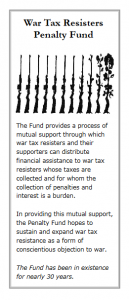 One of the ways war tax resisters support each other is through the War Tax Resisters Penalty Fund (WTRPF). This fund was founded in 1982 by the North Manchester, Indiana chapter of the Fellowship of Reconciliation, and later became a separate organization. Its purpose is to provide mutual aid for war tax resisters who have been collected on by the IRS. WTRPF also makes war tax resistance possible for more people:
One of the ways war tax resisters support each other is through the War Tax Resisters Penalty Fund (WTRPF). This fund was founded in 1982 by the North Manchester, Indiana chapter of the Fellowship of Reconciliation, and later became a separate organization. Its purpose is to provide mutual aid for war tax resisters who have been collected on by the IRS. WTRPF also makes war tax resistance possible for more people:
[The founders] found that IRS interest and penalties kept many people from continuing their war tax resistance, and prevented many more from even considering such a witness. The founders decided to invite sympathetic people to form a broad base that would help sustain and suppport war tax resisters. They hoped that with hundreds of supporters they could lighten the resisters’ financial burdens and also actively involve larger numbers of people in the war tax resistance movement.
After a couple years of dormancy, in late 2013 a new team of war tax resisters affiliated with NWTRCC revitalized the fund. (Note that although NWTRCC also hosts the fund’s website, we are separate organizations.)
Resisters apply to the fund, showing proof of collection. Resisters can receive money to cover any penalties and interest (not the original amount owed) charged and collected by the IRS. The fund sends appeals to its members for money to cover all the requests. In its current form, the WTRPF asks members to contribute a “share” of around $30, but members can send as much or as little as they want – every bit helps!
In April 1998, the fund sent out its first appeal letter with no request for money. In this case, it was because resisters had responded so overwhelmingly to the prior appeal that the fund was able to cover subsequent responses out of that money. But now, the last two letters from WTRPF have not asked for money because no resisters have asked for its support.
The IRS continues to reduce its collection efforts, so this may contribute to the current situation. The relatively small amounts resisted by most of us make us less appealing targets for IRS collection (although of course anyone resisting taxes may be collected upon). In addition, the times during which WTRPF was not operating at all may have caused it to fall off resisters’ radar. And while at times WTRPF has had as many as 800 members, today there are less than 200 active members.
The WTRPF is a fine example of mutual aid among people committing civil disobedience. By covering each others’ penalties and interest, resisters eliminate the financial disincentive to resist. Anyone can support WTRPF, as David Gross’ article for Waging Nonviolence emphasizes:
When people tell [Peter] Smith that they admire his stand and wish they had the courage to do it, he tells them to subscribe to the fund. That way they can help other resisters until they work up the courage to do it themselves. “You don’t have to be a war tax resister to support people,” he said. “Anybody who wants to can sign up to help, and it’s easy to do.”
Get on WTRPF’s mailing list if you haven’t already! And if the IRS has collected penalties and interest from you, you can apply for financial support. (You don’t even have to be a WTRPF member, although becoming a member afterward is certainly encouraged!) Keep our spirit of mutual aid and civil disobedience alive.

I have given and gotten help from the WTRPF over the years. I remember the few occasions in the past when resisters even had cars and houses seized by the IRS as a result of resisted taxes. I was taken to court by the Justice Department in the 1980s because I refused to tell the IRS where my money was so they could seize it. The Federal District Court in Brooklyn ruled that I did not have to cooperate with the IRS. It is an important part of WTR that people who may not be resisters support those who are.